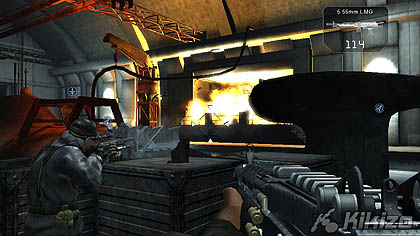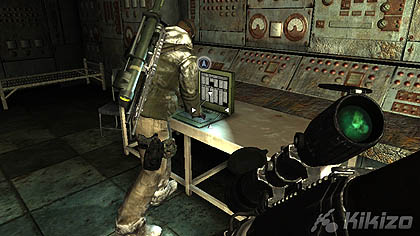Conflict: Denied Ops - Pivotal Interview
Is the Conflict series about to go AAA? Terry Watts denies all knowledge of certain things (like SCi turbulence affecting development), while opening up on others (like the new Conflict: Denied Ops game).
Page: 1 2
Page 2
Kikizo: You've got a completely new story as well, innit?
Watts: Yes, it's a brand new story. The story is that General Remiraz, who's a fictional character, has overthrown the Venezuelan government in a coup, and the US government aren't happy about that. But he's threatened them with a nuclear missile if they interfere with what's going on. So in order to get around that, the US have sent in their S.A.D. Division, which is Special Activities Division, and they are a division that are fully deniable. So if any of the operatives get caught or captured, the US will deny all knowledge of these guys. They operate under the radar and perform tasks for the US but without anybody knowing.
Kikizo: I think it's often interesting to look at where a game with a military and political story sits on the spectrum to see if it stays neutral or takes risks - where is Denied Ops on this sort of moral spectrum?
Watts: We wanted a game that was based around real-world locations, and we wanted a storyline that was plausible in reality. Now obviously the storyline is not factual at all, it's purely fictional, but we wanted it to be plausible so that people weren't taken out of the reality of the real-world locations they're in. We wanted them to believe that this could possibly happen, but it is just fictional and we're not trying to send out any kind of moral message to anybody about it. At the end of the day it is just a game.
Kikizo: What's does the 'Puncture' technology you've developed allow for in the game?
Watts: It's a new bit of technology developed inside Pivotal to go with our in-house engine. It basically allows players to shoot through flimsy wooden surfaces, so you can shoot through a wooden board and cut out whatever hole that bullet makes on the board. So it's not predefined destruction like on a lot of objects, this is defined based on where you shoot it. And it's all load bearing as well, so if you shoot out at the top of it the whole bottom will fall away. So what that means in the game is that you can shoot out gaps large enough for you to look through, or even to crawl through, and you can also look through and shoot enemies on the other side of it. So it's a fully dynamic system allowing you to cut these holes.
Kikizo: I saw on a larger scale too the destruction of buildings that look realistic too, are they real-time as well or predetermined?
Watts: The larger destruction set-pieces are animated, but the animators have done a great job of making them look like it's actual physics operating underneath that. All that animation was done with a real physics engine, recorded, and then it's played back in the game, so it looks completely realistic.
Kikizo: What about dynamic difficulty, because it seems there is always one group of the audience or another that takes issue with a game's difficulty or length of a campaign.
Watts: We've got three difficulty levels, and a fourth that's unlockable once you've completed the game. But we've also got an auto-adjust difficulty level on the campaign structure, so as you work through the campaign, the game will get more difficult within its span, so Easy will become harder as it goes along, but will still remain within that Easy within that band. But yes there's also a dynamic system that adjusts as you're working through the campaign, so hopefully there's enough control for the player and also the right difficulty balance as well.
Kikizo: But, erm, what if you're clearly rubbish at it? Does it work the other way?
Watts: Well, no it doesn't work the other way; we're hoping that we've made Easy easy enough for the most casual player, because we are trying to open it up to new people so we've made a conscious effort to make Easy approachable to everybody!
Conflict: Denied Ops is released on February 8th in the UK and February 12th in the US.
Page: 1 2







 Satoru Iwata Video Interview - the late Nintendo president spoke with Kikizo in 2004 as 'Nintendo Revolution' loomed.
Satoru Iwata Video Interview - the late Nintendo president spoke with Kikizo in 2004 as 'Nintendo Revolution' loomed. Kaz Hirai Video Interview - the first of Kikizo's interviews with the man who went on to become global head of Sony.
Kaz Hirai Video Interview - the first of Kikizo's interviews with the man who went on to become global head of Sony. Ed Fries Video Interview - one of Xbox's founders discusses an epic journey from Excel to Xbox.
Ed Fries Video Interview - one of Xbox's founders discusses an epic journey from Excel to Xbox. Yu Suzuki, the Kikizo Interview - we spend time with one of gaming's most revered creators.
Yu Suzuki, the Kikizo Interview - we spend time with one of gaming's most revered creators. Tetris - The Making of an Icon: Alexey Pajitnov and Henk Rogers reveal the fascinating story behind Tetris
Tetris - The Making of an Icon: Alexey Pajitnov and Henk Rogers reveal the fascinating story behind Tetris Rare founders, Chris and Tim Stamper - their only interview? Genuinely 'rare' sit down with founders of the legendary studio.
Rare founders, Chris and Tim Stamper - their only interview? Genuinely 'rare' sit down with founders of the legendary studio. The History of First-Person Shooters - a retrospective, from Maze War to Modern Warfare
The History of First-Person Shooters - a retrospective, from Maze War to Modern Warfare